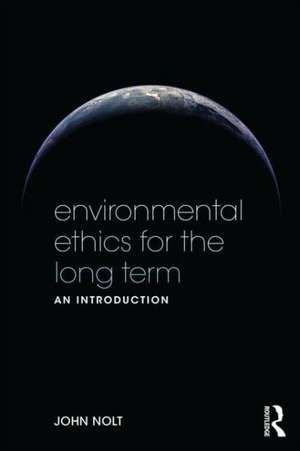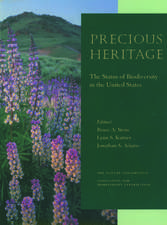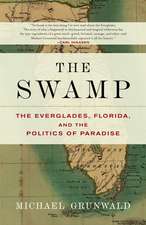Environmental Ethics for the Long Term: An Introduction
Autor John Nolten Limba Engleză Paperback – 14 oct 2014
| Toate formatele și edițiile | Preț | Express |
|---|---|---|
| Paperback (1) | 372.71 lei 3-5 săpt. | +26.31 lei 7-11 zile |
| Taylor & Francis – 14 oct 2014 | 372.71 lei 3-5 săpt. | +26.31 lei 7-11 zile |
| Hardback (1) | 767.47 lei 6-8 săpt. | |
| Taylor & Francis – 20 oct 2014 | 767.47 lei 6-8 săpt. |
Preț: 372.71 lei
Nou
Puncte Express: 559
Preț estimativ în valută:
71.33€ • 77.45$ • 59.91£
71.33€ • 77.45$ • 59.91£
Carte disponibilă
Livrare economică 01-15 aprilie
Livrare express 18-22 martie pentru 36.30 lei
Preluare comenzi: 021 569.72.76
Specificații
ISBN-13: 9780415535847
ISBN-10: 0415535840
Pagini: 289
Ilustrații: 3 black & white illustrations, 6 black & white tables
Dimensiuni: 174 x 246 x 18 mm
Greutate: 0.55 kg
Ediția:New.
Editura: Taylor & Francis
Colecția Routledge
Locul publicării:Oxford, United Kingdom
ISBN-10: 0415535840
Pagini: 289
Ilustrații: 3 black & white illustrations, 6 black & white tables
Dimensiuni: 174 x 246 x 18 mm
Greutate: 0.55 kg
Ediția:New.
Editura: Taylor & Francis
Colecția Routledge
Locul publicării:Oxford, United Kingdom
Cuprins
Preface Acknowledgments 1. Scientific Background 2. Logic, Prescriptive Reasoning, and Ethical Theories 3. Near-term Anthropocentrism 4. Long-term Anthropocentrism 5. Animal Ethics 6. Ethics of Life 7. Applications and Speculations Glossary References
Notă biografică
John Nolt is a philosophy professor at the University of Tennessee. He began his career as a logician, but soon took to moonlighting as an environmental activist. The activism eventually drew him into academic work in environmental ethics. He has published many articles and several books in both philosophical logic and environmental studies.
Recenzii
"John Nolt’s Environmental Ethics for the Long Term is an invaluable addition to the literature in environmental ethics. Nolt’s emphasis on analytical thought and logical reasoning makes this book pleasingly rigorous, and his rich discussion of our responsibilities to distant human generations both clarifies and develops existing debates. Highly recommended!"
Clare Palmer, Professor of Philosophy, Texas A&M University, USA
"Prof. Nolt has an excellent grasp of the topics, and he deals with the most significant issues within these topics. His writing style is lucid and accessible to most undergraduate students. I highly recommend Environmental Ethics for the Long Term as a text for an introductory course in Environmental Ethics."
Ernest Partridge, Retired Hulings Professor of Environmental Ethics, Northland College, USA
"This book has important things to say about key issues of our time – climate change, biodiversity loss, resource security. Our responses will shape the future for humans, for other species, for the planet. Nolt weaves together science, ethics and policy analysis in a way that is accessible, engaging and challenging. He makes a compelling case for broad policies and individual actions that will make the future better and he demonstrates why environmental ethics matters."
Robert Elliot, University of the Sunshine Coast, Australia
Clare Palmer, Professor of Philosophy, Texas A&M University, USA
"Prof. Nolt has an excellent grasp of the topics, and he deals with the most significant issues within these topics. His writing style is lucid and accessible to most undergraduate students. I highly recommend Environmental Ethics for the Long Term as a text for an introductory course in Environmental Ethics."
Ernest Partridge, Retired Hulings Professor of Environmental Ethics, Northland College, USA
"This book has important things to say about key issues of our time – climate change, biodiversity loss, resource security. Our responses will shape the future for humans, for other species, for the planet. Nolt weaves together science, ethics and policy analysis in a way that is accessible, engaging and challenging. He makes a compelling case for broad policies and individual actions that will make the future better and he demonstrates why environmental ethics matters."
Robert Elliot, University of the Sunshine Coast, Australia
Descriere
Broad in scope, this introduction to environmental ethics considers both contemporary issues and the extent of humanity’s responsibility for distant future life. John Nolt, a logician and environmental ethicist, interweaves contemporary science, logical analysis, and ethical theory into the story of the expansion of ethics beyond the human species and into the far future. Informed by contemporary environmental science, the book deduces concrete policy recommendations from carefully justified ethical principles and ends with speculations concerning the deepest problems of environmental ethics. Pedagogical features include chapter outlines, annotated suggestions for further readings, the explanations of key terms when first mentioned, and an extensive glossary.






